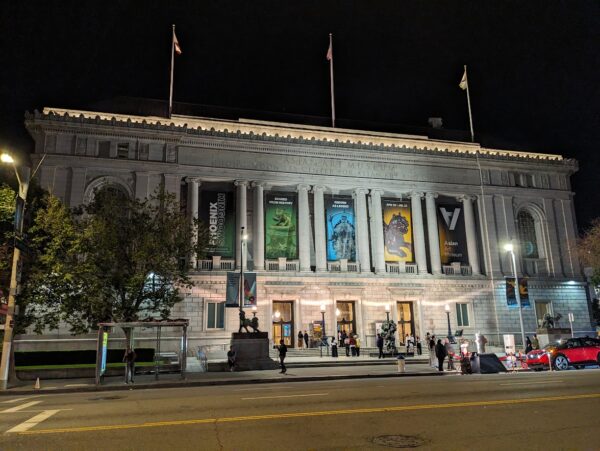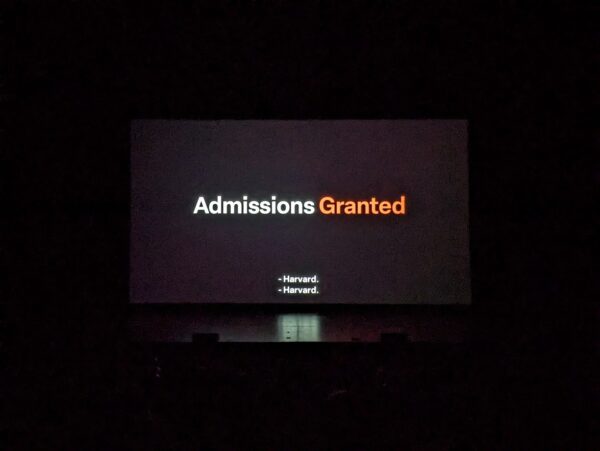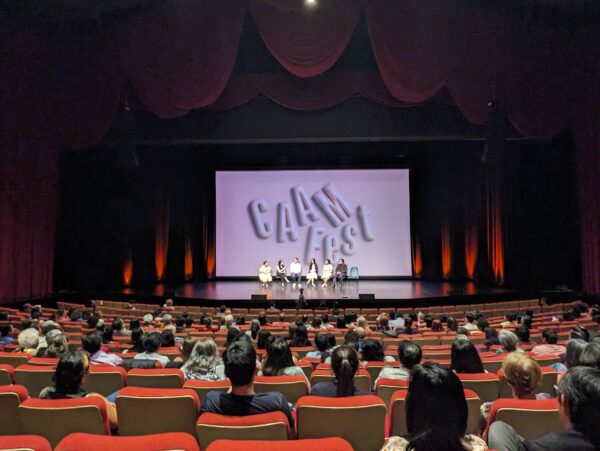This year’s opening night film was the documentary Admissions Granted:
“In the run-up to the landmark Supreme Court case pitting Asian American plaintiffs against Harvard University, controversial legal strategist Edward Blum took direct aim at dismantling affirmative action, energizing activists on both sides. Admissions Granted tracks the case’s emotional, high-stakes journey to the Supreme Court. Directors Hao Wu (76 Days and 2022 CAAM Mentor) and Miao Wang (CAAM-Funded Beijing Taxi) weave interviews, news archive, and verité footage to produce an honest and hard look at the complexity of the affirmative action debate, revealing the divisions within the Asian American community and our nation’s increasing polarization on matters of race and inclusion.”
Because The Castro Theater is undergoing a major renovation, opening night’s screening occured at The Palace of Fine Arts – which I did not know had a HUGE 1,000 seat auditorium.
I thought the documentary was very well down and very well balanced, interviewing subjects on both sides of this complicated and emotionally fraught issue. I was particularly interested to see Edward Blum in the documentary, the controversial figure who has been leading the legal battle against affirmative action that I have often read about but not have seen or heard from.
Blum comes across as a wealthy but fairly mild mannered concerned citizen. I don’t quite completely understand his motivations. One could still see how he’s used Asian Americans as a wedge group to dismantle affirmative action. I was happy to learn from Blum that he seemed to also be concerned about ALDC admits – recruited athletes, legacy applicants, dean’s preferences (big donors), and children of faculty and staff (ALDC) – where they consist of 5% of the applicant pool at Harvard but 30% of an incoming class at Harvard.
Personally, I have mixed feelings about affirmative action. I am all for diversity in the classroom and on-campus and the goals of correcting historical wrongs, especially against African Americans for slavery and systemic racism since even before the founding of the United States in North America. I’m also for academic merit as the primary admissions criteria for elite educational institutions, which seems to have penalized Asian American applicants.
Educational injustice should be addressed much earlier in the education process prior to applying to college. I have always felt that educational funding and quality at the local level was way too dependent on whether you lived in a wealthy or poor neighborhood. The funding model of K-12 education is systematically racist in my opinion.
Every American, not just Asian Americans, who wants to understand affirmative action should watch this documentary. You won’t have to wait long – as Admissions Granted will be aired on MSNBC on June 30 at 9 p.m. ET:
“In a landmark Supreme Court case pitting Asian American plaintiffs against Harvard University, activists on both sides wrestle with hard truths about race, equality, and Asian Americans’ precarious status in America, as the fate of affirmative action hangs in the balance. “Admissions Granted” airs June 30 at 9 p.m. ET on MSNBC.”
After the screening, there was a panel discussion with the two filmmakers Hao Wu and Miao Wang as well as two of the then students profiled (on opposite sides of the debate) in the documentary:
The directors discuss their motivation for choosing the topic and the challenges it presents. Two film participants, Sally Chen and Michael Wang, shared their reactions to the film and how their perspectives on affirmative action have evolved. They discuss the need for reform and equity in the education system. The conversation touches on the role of Asian-Americans in the affirmative action debate and the implications of Supreme Court decisions.
The decision to prominently feature Edward Blum, a central figure in the affirmative action lawsuits, is explained as a result of his significant role and accessibility compared to other involved parties like lawyers, who didn’t want to talk and disclose their legal strategies in the case. Blum was quite willing to be interviewed.
Blum wasn’t pleased because he felt both sides weren’t adequately represented. However, the Harvard side also was equally not pleased because they didn’t think they were given enough attention. To be honest, I think Blum got plenty of air time to explain his position. Later at the VIP reception, I had asked Miao Wang why she didn’t go into the history of legacy admissions as a reaction to trying to limit the number of Jewish students at Harvard in the early 20th century. She had said that would have detracted from the focus of the documentary and would have gone down a rat hole and make the documentary even longer.
The filmmakers explain their commitment to balance and character-driven storytelling rather than a lecture-style approach. They elaborate on their process for selecting characters with direct connections to the lawsuit, emphasizing the importance of showcasing various perspectives. Sally reflects on the scarcity mentality surrounding educational opportunities and the need to imagine a world with more equitable access to education and resources. She suggests that institutions like elite universities shouldn’t monopolize resources and discusses broader societal issues beyond education. Michael reflects on his activism and the systemic issues underlying racial discrimination. There was a call for solidarity among Asian-Americans and other marginalized communities.
Overall, I thought it was a bold move by CAAM to have Admissions Granted as the opening night film, as affirmative action is a fairly controversial topic but glad the CAAM choose the film.
Gala
As usual, CAAMFest had the gala at the Asian Art Museum with food and fun and with a lot of like minded film lovers!
 CaaMFest 2024 is May 9-19, 2024 in San Francisco and Oakland.
CaaMFest 2024 is May 9-19, 2024 in San Francisco and Oakland.










